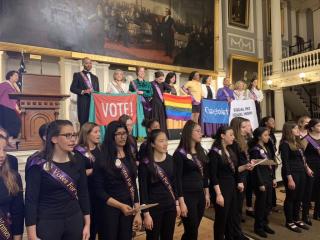Salem Mayor Kim Driscoll Speaks at Boston Women’s Suffrage Celebration

Salem Mayor Kim Driscoll tonight spoke as part of a program of women leaders celebrating the centennial of women’s suffrage. The event took place at Faneuil Hall in Boston and was organized by the Greater Boston Women’s Vote Centennial and the Women’s Suffrage Celebration Coalition of Massachusetts.
The full text of her remarks, as prepared, is below.
----------
Thank you to Shirley Leung, the Women’s Suffrage Celebration Coalition, Greater Boston Women’s Vote Centennial, and Mayor Walsh.
In seven short years, Salem – the City I have been honored to lead since 2006 – will celebrate our quadricentennial: Salem turns 400 years old. In that context, marking this year as the centennial of women’s suffrage is remarkable…and not necessarily in a good way. We’re almost a 400-year-old city; but, in only the last 100 have women had a right to vote. Of course, in Salem we’re a bit more well known for what transpired 327 years ago – in 1692, we weren’t so good to women.
As we turn to our history, we stand on the shoulders of so many who came before us, I want to add Salem native, Sarah Remond – an African American and anti-slavery advocate – to the list of those we should recognize. Sarah was born free in Massachusetts and became an internationally known activist for human rights and women’s suffrage. She filed one of the earliest lawsuits protesting segregation in 1853 here in Boston. She spoke at the National Women’s Rights Convention in New York City in 1858. And as a member of the American Equal Rights Association she was a guest lecturer and toured the Northeast campaigning for universal suffrage. Discouraged by the split in the woman suffrage movement after the Civil War, she moved to Italy in 1866, where she studied medicine. Just a couple of years ago, we dedicated a new park in Salem in honor of Sarah and her family, as a way to ensure her work is not forgotten.
As the first woman to serve as Salem’s Mayor – after 49 men before me – as the daughter of an immigrant and a Navy officer – as a mother – no legacy, no value is as important to me as this: the true, full measure of our freedom as Americans isn’t based on how we protect the interests of the most powerful among us. It’s based on how we grow the power of the least among us.
Women didn’t receive the right to vote. We didn’t earn it. It wasn’t granted to us. We were entitled to it from the very first second of this nation’s existence. But for 143 years it was withheld from us.
That we’re here today commemorating 100 years of suffrage is well and good. But let’s not forget those other 143 years. Years between the declaration that all men are created equal and the enfranchisement and empowerment of more than half of this nation. That it took 143 years will always be a mark on this country.
And, hopefully, it will prompt us to ask: who, today, are we also excluding? Whether it’s based on where their family is from, what language they speak, what color they are, who they love or how they identify. My greatest hope is that this, the centennial of women’s suffrage, will spark a new perspective here in Massachusetts, though – arguably – more needed today in Washington, D.C. A perspective that values every person wholly, endowed with unalienable rights, and worth having their voice heard.
And it’s up to us to listen.

